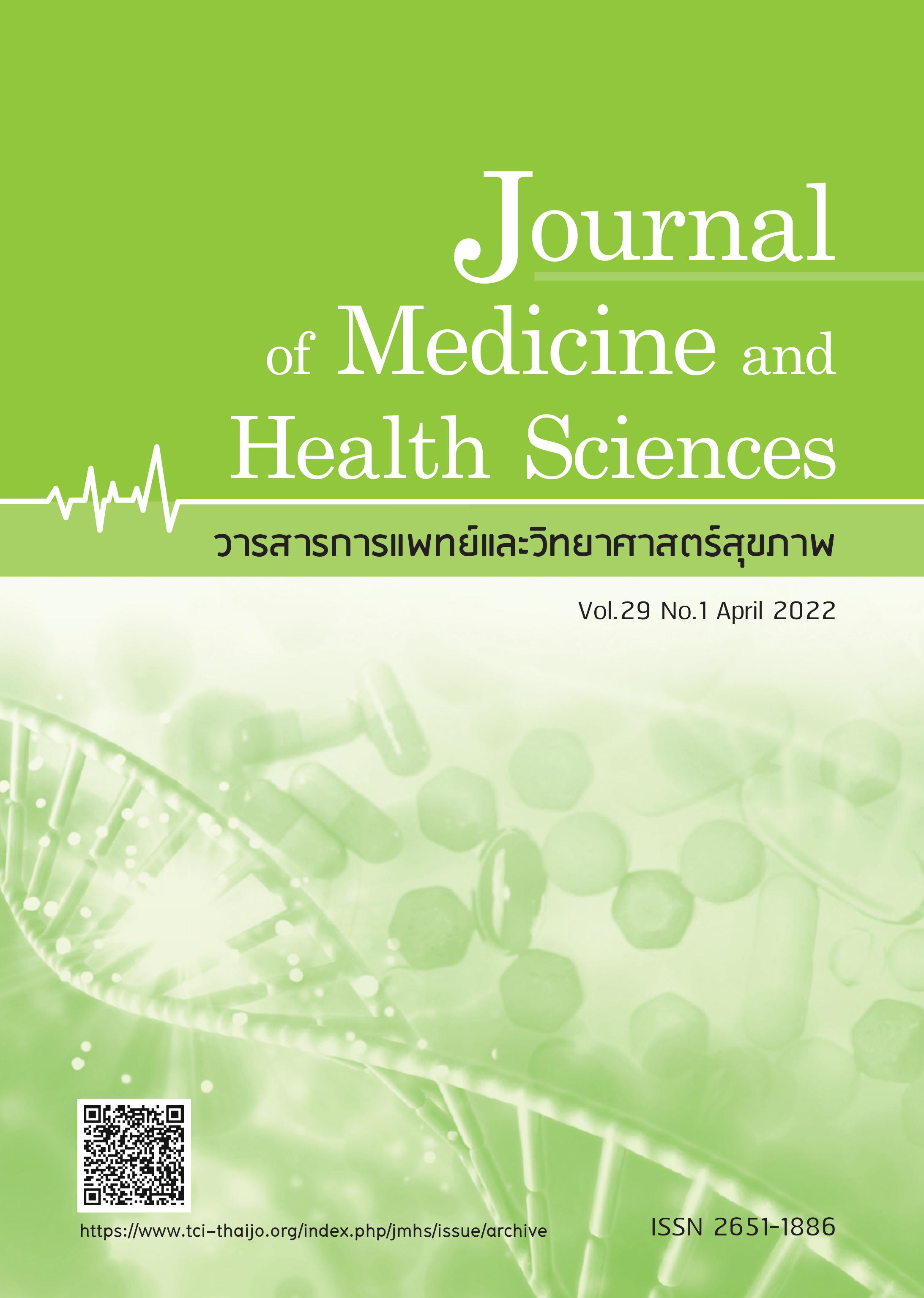เครื่องมือคัดกรองความสามารถด้านการรู้คิดจากการสัมภาษณ์ทางโทรศัพท์: การทบทวนวรรณกรรมเป็นระบบแบบมีขอบเขต
คำสำคัญ:
การรู้คิด, ภาวะสมองเสื่อม, การคัดกรองทางโทรศัพท์, การสัมภาษณ์, การทบทวนวรรณกรรมเป็นระบบแบบมีขอบเขตบทคัดย่อ
บทคัดย่อ
การทบทวนวรรณกรรมเป็นระบบแบบมีขอบเขตเกี่ยวกับการคัดกรองหรือประเมินความสามารถด้านการรู้คิดจากการสัมภาษณ์ทางโทรศัพท์ มุ่งเน้นการทบทวนและวิเคราะห์หัวข้อองค์ประกอบการรู้คิด การตรวจสอบคุณภาพเครื่องมือ และพิจารณาการนำไปใช้เพื่อคัดกรองภาวะสมองเสื่อมในผู้สูงอายุ การศึกษานี้สืบค้นงานวิจัยประเด็นเครื่องมือคัดกรองหรือประเมินความสามารถด้านการรู้คิดจากการสัมภาษณ์ทางโทรศัพท์ที่ตีพิมพ์และเผยแพร่ระหว่าง พ.ศ. 2560-2564 ดำเนินการคัดกรองและสกัดข้อมูลเพื่อพิจารณาหัวข้อองค์ประกอบการรู้คิด และตรวจสอบคุณสมบัติตามที่กำหนด ผลการวิจัย พบว่า งานวิจัยที่ผ่านเกณฑ์การคัดเลือกจำนวน 12 เรื่อง ครอบคลุมแบบคัดกรองจำนวน 14 ชุด เครื่องมือคัดกรองหรือประเมินความสามารถด้านการรู้คิดจากการสัมภาษณ์ทางโทรศัพท์ส่วนใหญ่มีองค์ประกอบการรู้คิดด้านด้านการใช้ภาษา (ร้อยละ 92.86) มากที่สุด รองลงมาคือ การรับรู้ เช่น วัน เวลา บุคคล สถานที่ (ร้อยละ 78.57) และ ความจำ (ร้อยละ 50.00) เครื่องมือคัดกรองหรือประเมินความสามารถด้านการรู้คิดจากการสัมภาษณ์ทางโทรศัพท์มีการตรวจสอบคุณสมบัติของเครื่องมือตามค่าดัชนีการวัดทางจิตวิทยา และสามารถนำไปใช้คัดกรองภาวะสมองเสื่อมในผู้สูงอายุได้ สรุปได้ว่า แบบคัดกรองที่พบในการศึกษาครั้งนี้พัฒนาในต่างประเทศ มีการทดสอบที่ครอบคลุมองค์ประกอบการรู้คิดที่สำคัญ และสอดคล้องกับบริบทสังคม และวัฒนธรรม ดังนั้น การพัฒนาเครื่องมือคัดกรองหรือประเมินความสามารถด้านการรู้คิดจากการสัมภาษณ์ทางโทรศัพท์ ฉบับภาษาไทย จึงมีความจำเป็น
เอกสารอ้างอิง
Bozoki A, Giordani B, Heidebrink JL, et al. Mild cognitive impairments predict dementia in nondemented elderly patients with memory loss. Arch Neurol 2001;58:411-6.
Hughes TF. Promotion of cognitive health through cognitive activity in the aging population. Aging Health 2010;6:111-21.
Ciemins EL, Holloway B, Jay Coon P, et al. Telemedicine and the mini-mental state
examination: assessment from a distance. Telemed J E Health 2009;15:476-8.
Brandt J, Spencer M, Folstein M. The telephone interview for cognitive status.
Neuropsychiatry Neuropsychol Behav Neurol 1988;1:111-7.
Castanho T, Amorim L, Zihl J, et al. Telephone-based screening tools for mild cognitive impairment and dementia in aging studies: a review of validated instruments. Front Aging Neurosci 2014;6.
Arksey H, O’Malley L. Scoping studies: towards a methodological framework. Int J Soc Res Methodol 2005;8:19-32.
Tricco AC, Antony J, Zarin W, et al. A scoping review of rapid review methods. BMC medicine 2015;13:1-15.
Larner AJ. Cognitive testing in the COVID-19 era: can existing screeners be adapted for telephone use?. Neurodegener Dis Manag 2021;11:77-82.
Pillemer S, Papandonatos GD, Crook C, et al. The modified telephone-administered minnesota cognitive acuity screen for mild cognitive lmpairment. J Geriatr Psychiatry Neurol 2018;31:123-8.
Muñoz-García M, Cervantes S, Razquin C, et al. Validation study of a Spanish version of the modified telephone interview for cognitive status (STICS-m). Gac Sanit 2019;
:415-20.
Burns A, Harrison JR, Symonds C, et al. A novel hybrid scale for the assessment of cognitive and executive function: The Free-Cog. Int J Geriatr Psychiatry 2021;36: 566-72.
Katz MJ, Wang C, Nester CO, et al. T-MoCA: A valid phone screen for cognitive impairment in diverse community samples. Alzheimers Dement (Amst) 2021;13: e12144.
Naharci MI, Celebi F, Oguz EO, et al. The Turkish Version of the telephone cognitive screen for detecting cognitive impairment in older adults. Am J Alzheimers Dis Other Demen 2019;35:1533317519889810.
Van Mierlo LD, Wouters H, Sikkes SA, et al. Screening for mild cognitive impairment and dementia with automated, anonymous online and telephone cognitive self-tests. J Alzheimers Dis 2017;56:249-59.
Nelson LD, Barber JK, Temkin NR, et al. Validity of the brief Test of adult cognition by telephone in Level 1 trauma center patients six months post-traumatic Brain Injury: A TRACK-TBI Study. J Neurotrauma 2021;38:1048-59.
Dams-O’Connor K, Sy KTL, Landau A, et al. The Feasibility of telephoneadministered cognitive testing in Individuals 1 and 2 years after inpatient rehabilitation for traumatic brain injury. J Neurotrauma 2018;35:1138-45.
Klil-Drori S, Phillips N, Fernandez A, et al. Evaluation of a telephone version for the montreal cognitive Assessment: establishing a cutoff for normative data from a crosssectional study. J Geriatr Psychiatry Neurol 2021:08919887211002640.
Bentvelzen AC, Crawford JD, Theobald A, et al. Validation and normative data for the modified telephone interview for cognitive status: The sydney memory and ageing study. J Am Geriatr Soc 2019;67: 2108-15.
Mandrekar JN. Receiver Operating Characteristic Curve in Diagnostic Test Assessment. J Thorac Oncol 2010;5: 1315-6.
Georgakis MK, Papadopoulos FC, Beratis I, et al. Validation of TICS for detection of dementia and mild cognitive impairment among individuals characterized by low levels of education or illiteracy: a population-based study in rural Greece. Clin Neuropsychol 2017;31:61-71.
Ihle A, Gouveia ÉR, Gouveia BR, et al. The cognitive telephone screening Instrument (COGTEL): A Brief, Reliable, and Valid Tool for Capturing Interindividual differences in cognitive functioning in Epidemiological and Aging Studies. Dement Geriatr Cogn Dis Extra 2017;7:339-45.
Tremont G, Papandonatos GD, Springate B, et al. Use of the Telephone-administered
minnesota cognitive acuity screen to detect mild cognitive impairment. Am J Alzheimers Dis Other Demen 2011;26:555-62.
Fong TG, Inouye SK. The telephone interview for cognitive status. Cogn Behav Neurol 2018;31:156-7.
Fong TG, Fearing MA, Jones RN, et al. Telephone interview for cognitive status: Creating a crosswalk with the Mini-Mental State Examination. Alzheimers Dement 2009;5:492-7.
Konagaya Y, Washimi Y, Hattori H, et al. Validation of the telephone interview for cognitive status (TICS) in Japanese. Int J Geriatr Psychiatry 2007;22:695-700.
Baccaro A, Segre A, Wang YP, et al. Validation of the Brazilian-portuguese version of the
modified telephone Interview for cognitive status among stroke patients. Geriatr Gerontol Int 2015;15:1118-26.
Dujardin K, Duhem S, Guerouaou N, et al. Validation in french of the montreal cognitive assessment 5-minute, a brief cognitive screening test for phone administration. Rev Neurol (Paris) 2021;177:972-9.
Pendlebury ST, Welch SJV, Cuthbertson FC, et al. Telephone assessment of cognition after transient Ischemic attack and stroke. Stroke 2013;44:227-9.
Tun PA, Lachman ME. Telephone assessment of cognitive function in adulthood: the Brief Test of Adult Cognition by Telephone. Age Ageing 2006; 35:629-32.
Na-ChiangMai N, Wongupparaj P. Dementia screening tests in Thai older adults: a systematic review. Int J Child Dev Ment Health 2020;28:252-65.
Abzhandadze T, Lundström E, Buvarp D, et al. Development of a short-form Swedish version of the Montreal Cognitive Assessment (s-MoCA-SWE): protocol for a cross-sectional study. BMJ open 2021;11:e049035.
Masika GM, Yu DS, Li PW. Accuracy of the Montreal cognitive assessment in detecting
mild cognitive impairment and dementia in the rural African population. Arch Clin Neuropsychol 2021;36:371-80.
ดาวน์โหลด
เผยแพร่แล้ว
รูปแบบการอ้างอิง
ฉบับ
ประเภทบทความ
สัญญาอนุญาต

อนุญาตภายใต้เงื่อนไข Creative Commons Attribution-NonCommercial-NoDerivatives 4.0 International License.



